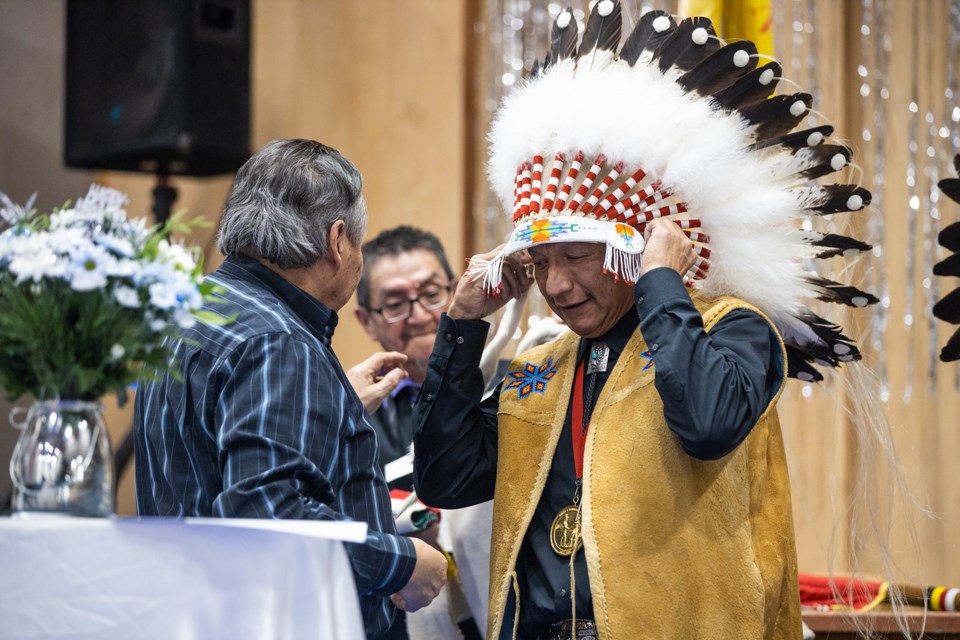STONEY NAKODA – Darcy Dixon has been re-elected to lead Bearspaw First Nation for at least another three years, adding to a legacy of three consecutive terms and an accumulative 22 years as band chief.
Securing 62.8 per cent of 720 votes cast in the Nov. 25 election, Dixon surpassed opponents Anthony Bearspaw, who previously sat on council and garnered 142 votes, and former chief David Bearspaw Jr., with 126 votes.
Joining Chief Dixon to represent Bearspaw on Stoney Tribal Council, is Coun. Rod Hunter, serving a third term in Mînî Thnî (Morley); Coun. Pierre Lefthand, serving a second term in Eden Valley; and newly elected Couns. Keith Lefthand, also representing Eden Valley, and Amos Dacster, representing Mînî Thnî.
Councillors were selected from a slate of seven candidates representing Eden Valley, where former Coun. Rex Daniels lost his seat with 230 votes, coming behind Keith Lefthand with 288 votes and Pierre Lefthand with 325.
Dacster, new to council in Mînî Thnî, had the highest number of votes – 281 – on a ballot of seven candidates. Hunter was elected with 263 votes.
According to chief electoral officer Marvin Yellowhorn, 66 per cent of eligible Bearspaw First Nation members cast their vote in the election.
Approximately 70 per cent of 1,371 eligible Bearspaw members cast their vote in the 2019 band election.
Yellowhorn, who has been working with the Bearspaw First Nation for about 20 years, also noted there were fewer people nominated for council this year than in recent elections.
“One thing that really caught my attention is that normally we would have about 14 councillor candidates for Morley and nine in Eden Valley,” said Yellowhorn. “It was definitely a smaller pool of candidates this year.”
Nomination removal
At least one candidate was removed through the nomination verification process plans to pursue legal action to change an election rule.
Laurel-Leigh Lefthand, a member of the Bearspaw First Nation, was nominated to run for council representing Eden Valley. She said she was eager to run for Stoney Tribal Council and to make change in her community, that was before she learned she was ineligible to do so for not living in Eden Valley.
A clause in Bearspaw’s election regulations which requires candidates to have lived in the community they intend to represent for at least six months prior to the nomination date, which was Nov. 3. The same rule applies to the person who nominates a candidate and the person who seconds the nomination.
Lefthand said she has been trying to move back home from where she currently resides in Kelowna and would find a way to live there if she had the opportunity to be elected.
“I really think the clause needs to be changed, apparently this was enacted in 1982, so it’s very outdated,” she said.
Lefthand said she had to move away in order to pursue a higher education – which she did – with the intent of one day coming back to better the community.
She started the process of looking for housing in 2017, around the time she graduated from the University of Alberta with a native studies degree, with a minor in political science.
“I was losing a lot of family members and I really felt like I had obtained my education and could bring that back home, so I started the application process to come back, and I started applying for jobs specifically within Stoney Nation to work in Morley or Eden Valley,” said Lefthand.
“I was not selected for any of the opportunities I applied for, nor was there any communication on any of my applications.”
In that time, Lefthand received a certificate in Indigenous governance and her current position is project coordinator for the unmarked burial projects in Tk’emkups First Nation.
While she may have been removed from the nomination list, Lefthand said that will not stop her pursuit for a seat on council and she plans to pursue legal action to “rectify the archaic election code.”
Yellowhorn said Bearspaw First Nation had submitted a proposal to Indigenous Services Canada (ISC) to change the clause prior to the election but was unable to secure funding to amend the election in time.
Bearspaw follows a custom elections code, which according to ISC, does not require federal oversight to amend.
Lefthand said if she does find a seat on council in the near future, her priority would be to address the drug and housing crises in Îyârhe (Stoney) Nakoda First Nation.
“Our reserve has seen an unfortunate number of deaths in the community due to drugs,” she said. “I don’t think there is really anything immediate happening to address that, so that’s something I’d like to tackle.”
In the last election, Bearspaw chief and council said they would focus on addressing housing and substance abuse issues among the First Nation.
The Outlook reached out to Bearspaw chief and councillors for comment about the election and future plans for the First Nation but did not receive a response in time for publication.
If there are any appeals to the Bearspaw election, they must be made in writing to Yellowhorn, the chief electoral officer, by Dec. 10.
Îyârhe Nakoda First Nation encompasses Bearspaw, Chiniki and Goodstoney First Nations and is jointly governed under Stoney Tribal Council. Goodstoney Nation members will head to the polls Dec. 9 to vote for their chief and council.
The Local Journalism Initiative is funded by the Government of Canada. The position covers Îyârhe (Stoney) Nakoda First Nation and Kananaskis Country.




